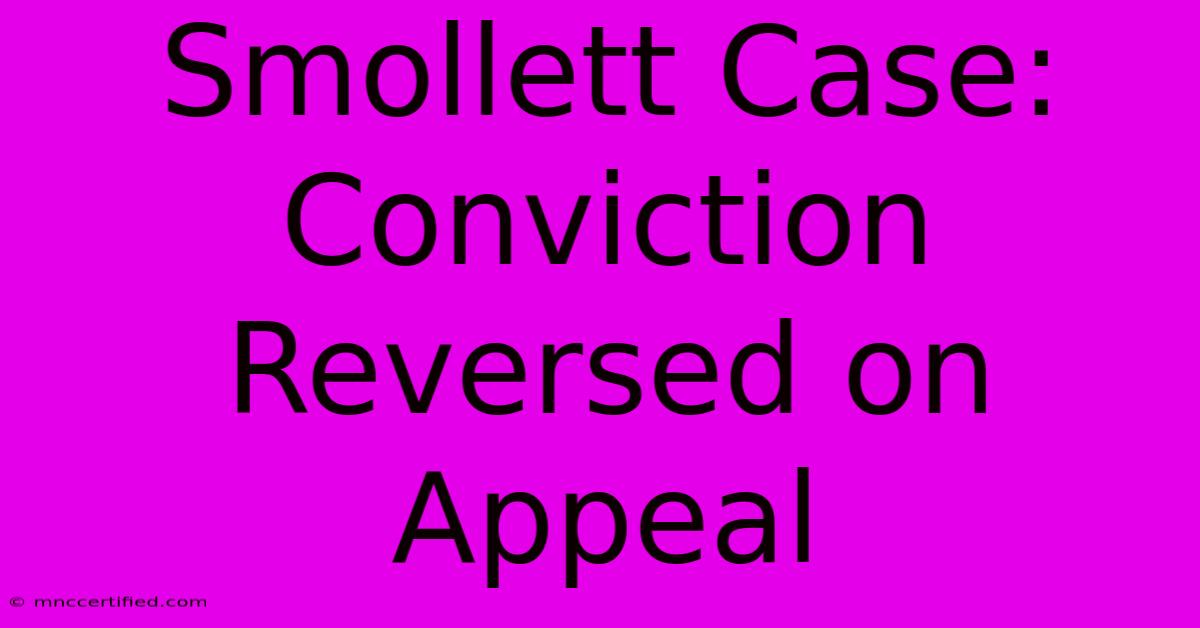Smollett Case: Conviction Reversed On Appeal

Table of Contents
Smollett Case: Conviction Reversed on Appeal – A Deeper Dive into the Legal Controversy
The Jussie Smollett case captivated the nation, sparking intense debate about race, media manipulation, and the complexities of the American legal system. His conviction for staging a hate crime was ultimately reversed on appeal, raising significant questions about due process and prosecutorial overreach. This article delves into the details of the case, the reasons behind the appeal's success, and the broader implications of the ruling.
The Original Charges and Conviction
Jussie Smollett, a then-actor on the television show Empire, claimed to have been the victim of a homophobic and racist attack in Chicago in January 2019. He reported being assaulted by two masked individuals who shouted racial and homophobic slurs, poured bleach on him, and placed a noose around his neck. The incident immediately garnered national attention, fueling outrage and sparking conversations about hate crimes in the United States.
However, the Chicago Police Department's investigation revealed inconsistencies in Smollett's account. Eventually, he was charged with 16 felony counts of disorderly conduct for allegedly staging the entire incident. This was a significant shift, transforming him from a victim to a perpetrator. In 2021, Smollett was found guilty on five of these counts and sentenced to 150 days in jail, along with community service and a fine.
The Appeal and Reversal
Smollett's legal team argued that several errors during the trial prejudiced his case and violated his rights. Their key argument centered on the prosecutor's alleged misconduct, particularly regarding the selection of the jury and the handling of evidence. Specifically, they claimed the judge improperly dismissed potential jurors who expressed skepticism about the prosecution's case, resulting in a biased jury pool. They also argued the prosecution presented inflammatory and prejudicial evidence that was not directly relevant to the charges.
The appellate court agreed with key aspects of Smollett's arguments. In a significant ruling, the conviction was overturned, primarily due to the finding that the trial judge erroneously denied Smollett's motion to dismiss certain counts and because of the special prosecutor's actions that were deemed inappropriate. This didn't declare Smollett innocent, but rather stated that the trial process was flawed and therefore invalidated the conviction. The court emphasized procedural irregularities and focused on the judge’s actions rather than commenting extensively on the evidence's credibility.
Implications and Ongoing Debate
The reversal of Smollett's conviction ignited a fresh wave of discussion. Supporters lauded the decision as a victory for due process and a critique of prosecutorial overreach. They argued that the initial rush to judgment, fueled by media coverage, unfairly prejudiced the trial.
Critics, however, pointed to the substantial evidence suggesting Smollett fabricated the entire event. They expressed concerns that the reversal sends the wrong message, undermining the seriousness of hate crimes and potentially encouraging similar actions in the future. The case continues to serve as a cautionary tale about the power of media narratives and the importance of thorough and impartial investigations.
Key Takeaways:
- The Smollett case highlighted the complexities of high-profile cases and the intense scrutiny they face from the media and the public.
- The appellate court's focus on procedural issues rather than the merits of the case underscores the importance of due process in the American justice system.
- The ongoing debate surrounding the case reflects the deep divisions within society on issues of race, justice, and media responsibility.
Further Research: For a more comprehensive understanding, readers are encouraged to consult legal databases and news archives covering the Smollett case, including court documents and related journalistic reports. Analyzing multiple perspectives is crucial for forming a well-rounded opinion. Searching for terms like "Jussie Smollett appeal ruling analysis" and "Smollett case legal implications" will yield further insights.

Thank you for visiting our website wich cover about Smollett Case: Conviction Reversed On Appeal. We hope the information provided has been useful to you. Feel free to contact us if you have any questions or need further assistance. See you next time and dont miss to bookmark.
Featured Posts
-
Gap Insurance Westlake Financial
Nov 22, 2024
-
Captive Insurance Cayman Islands
Nov 22, 2024
-
Jude Law Joins Star Wars Fan Base
Nov 22, 2024
-
Penn Engineering Launches Responsible Innovation
Nov 22, 2024
-
Underwoods College Choice Michigan Stats
Nov 22, 2024